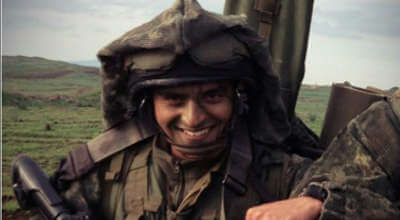Sgt. Yaakov Mizrahi, 27, is a combat soldier in the Shimshon Battalion of the Kfir Brigade. Unlike the soldiers who serve with him, however, he is in the midst of his second round of military service, having served for six years in the Mexican Navy.
What made Sgt. Mizrahi decide to become the first in his family to leave everything and come to Israel to enlist?
“In my family there was always the feeling that we should contribute to the country, even from far away,” he said. “I decided the best path for me would be to enlist in the IDF.”
At age 16, while still living in Mexico, Yaakov enlisted in military school, where he spent three years. Afterwards, he served for a year in the Mexican Navy and then enrolled in officer’s training.
Eventually, Yaakov decided that it was his turn to participate in Israel’s defense. He resolved to make aliyah and join the IDF, seeing it as the best possible way to contribute to Israel.
According to Sgt. Mizrahi, the main factor that motivated him to move to Israel and join the IDF was the story of his uncle, who volunteered in the Mexican Air Force as a pilot during the Second World War. During the war, he served in Syria and spent time in Israel, where he saw the troubled life people led under the British Mandate.
Afterwards, he felt he had missed an opportunity to help because he had no citizenship. He brought his story back to his family in Mexico, and since then the family has felt it their duty to contribute to Israel.
An Important Choice
Before enlisting in the IDF, Yaakov came to Israel to study, arriving during the Second Lebanon War.
“Following the war was a difficult time,” said Sgt. Mizrahi. The results of the war and the fact that his family was thousands of miles away were not easy to handle.
Nonetheless, Sgt. Mizrahi decided not to return to Mexico, but rather to enlist as a combat soldier in the IDF.
“At first, it was a little difficult for me to tell my family that I had enlisted, because they know that here I will always be in danger, and if there is [military] activity or an operation they understand that I will probably take part in it,” he said. “Eventually, my family accepted the fact that I had enlisted and supported me, because they knew that this is what I like and that this is what I want to do. But the truth is that even if they didn’t accept it, I would continue in the military because this is where I belong, and I am happy that I can give something of myself.”
And how does Sgt. Mizrahi view his decision to serve in the IDF, at a time when many of his friends already had careers and families in Mexico?
“There is great importance in what I decided to do, stemming first and foremost from Zionism,” he said. “People who were born and raised here and have lived here all their life don’t understand anti-Semitism like I do, and it is important for there to be lone soldiers who have immigrated to Israel, who can contribute something to the state and to explain this facet.”
Sgt. Mizrahi added that, if possible, he would be happy to serve as an officer in the IDF.
Sgt. Mizrahi also acknowledges the benefits and challenges of the age gap that separates him from many of his fellow soldiers—some of whom are as young as 18.
“There are situations in which there is activity and because of my experience I find one way of reaching a solution, but they don’t always accept it because I’m not a commander,” he said. “On the other hand, although I am 27 years old, serving alongside soldiers who are much younger than I am makes me feel like I’m their age, which is nice.”
Click here for the original article at idf.il.












